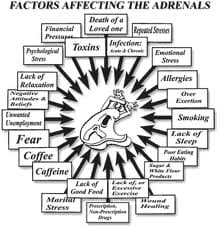(Part 1 of a 5 part series on Stress and the Adrenals)
I get ask ed daily in my office, “how long will it take for me to feel like myself again?” This is not an easy question to answer because the question you should be asking is, “how long did it take me to get this far out of balance?” However, there are some life style changes you can make that will speed up the process, but first ask yourself the following questions:
ed daily in my office, “how long will it take for me to feel like myself again?” This is not an easy question to answer because the question you should be asking is, “how long did it take me to get this far out of balance?” However, there are some life style changes you can make that will speed up the process, but first ask yourself the following questions:
Are you easily overwhelmed by everyday tasks that once were a breeze?
Do you get angry over things that never used to bother you?
Have you gained weight around the middle?
Is your sleep not as regular or as restful as it once was?
Is it difficult for you to concentrate on important tasks?
Do you crave foods that you know are unhealthy for you?
Are you catching more colds than before?
Is your libido what it once was?
Are you easily irritated by family members and co-workers?
Do you feel like you have no energy by the middle of the afternoon?
Are you using coffee or chocolate to make it through the day?
Are you drinking more alcohol to relieve stress?
Do aches and pains linger longer than they once did?
If you identify with several of these statements, your body’s system for adapting to stress is not responding optimally. If you identify with more than three or four of these statements, your body is sending signals that life’s stresses are overwhelming its ability to keep up. Life is stressful. We are all affected by stress, yet it is how we perceive and respond to the stressors in our lives that can have a big impact on our health. The consequences of stress are different for each individual.
What causes stress?
You likely could give a good description of circumstances or people who leave you at the end of your rope. Perhaps you have been feeling burned out and exhausted for years. Maybe you can’t understand why it is hard to scrape up enough energy for the simple tasks of life. Whether you are in a demanding job with constant pressure, a challenging graduate program in a competitive academic environment, or living frugally as a retiree trying to make ends meet, your stressful circumstances may be overwhelming your ability to cope, straining your stress response mechanisms to the limit.
Researchers have learned that most things that are different from the normal expectations of life trigger a stress response. Whether these events are real (actual emergency or trauma) or perceived (anxiety about a potential event), the stress response is surprisingly similar. When you constantly trigger your stress response mechanisms with events that are not resolved, your response mechanisms begin to become disjointed, improperly regulated and exhausted. Sometimes they fail altogether.
Most people think of stress as mental and emotional stress, however, imbalance in blood sugar and chronic inflammation anywhere in the body are also common chronic stressors. Ironically, each of these events is a potent stimulator of cortisol, the adrenal hormone produced to help us recover from stress. These imbalances must be addressed by your medical provider.
Scientists who study stress say that the events that cause the most mental and emotional stress usually have four similarities. First, we are stressed by things that are new to us. First-time experiences cause us to anticipate how we will feel during the event (pleasure or pain), triggering a stress response. Combine this with unpredictability, the second feature of mental and emotional stress, and you heighten the stress response. First time driving lessons on a busy city freeway is a good example-for both driver and instructor.
The third component is a sense of threat to your physical well-being or psyche. While it is not always thought of as stress, the nervous anticipation of someone else’s opinion of you is a threat to your psyche, and therefore a source of stress.
Stressful events typically cause you to feel as though you have experienced loss of control over your situation. Families with teenagers are often in this situation as teens become more independent and parents have to start to let go.
A perfect, yet subtle, example is the person in middle management. They feel the responsibility of performing new tasks (novelty) that typically have unpredictable outcomes and threaten their job approval while feeling like they don’t have control over the outcome. Consequently, middle managers are often considered to have the highest stress in most companies, leading to high turnover, burnout and poor job satisfaction.
It is important to remember that your perception of an event is really what creates most of the stress-often more than the event itself. After all, what builds stress in you might be another person’s adventure…sky diving, cocktail parties, public speaking.
Leave a Reply
You must be logged in to post a comment.